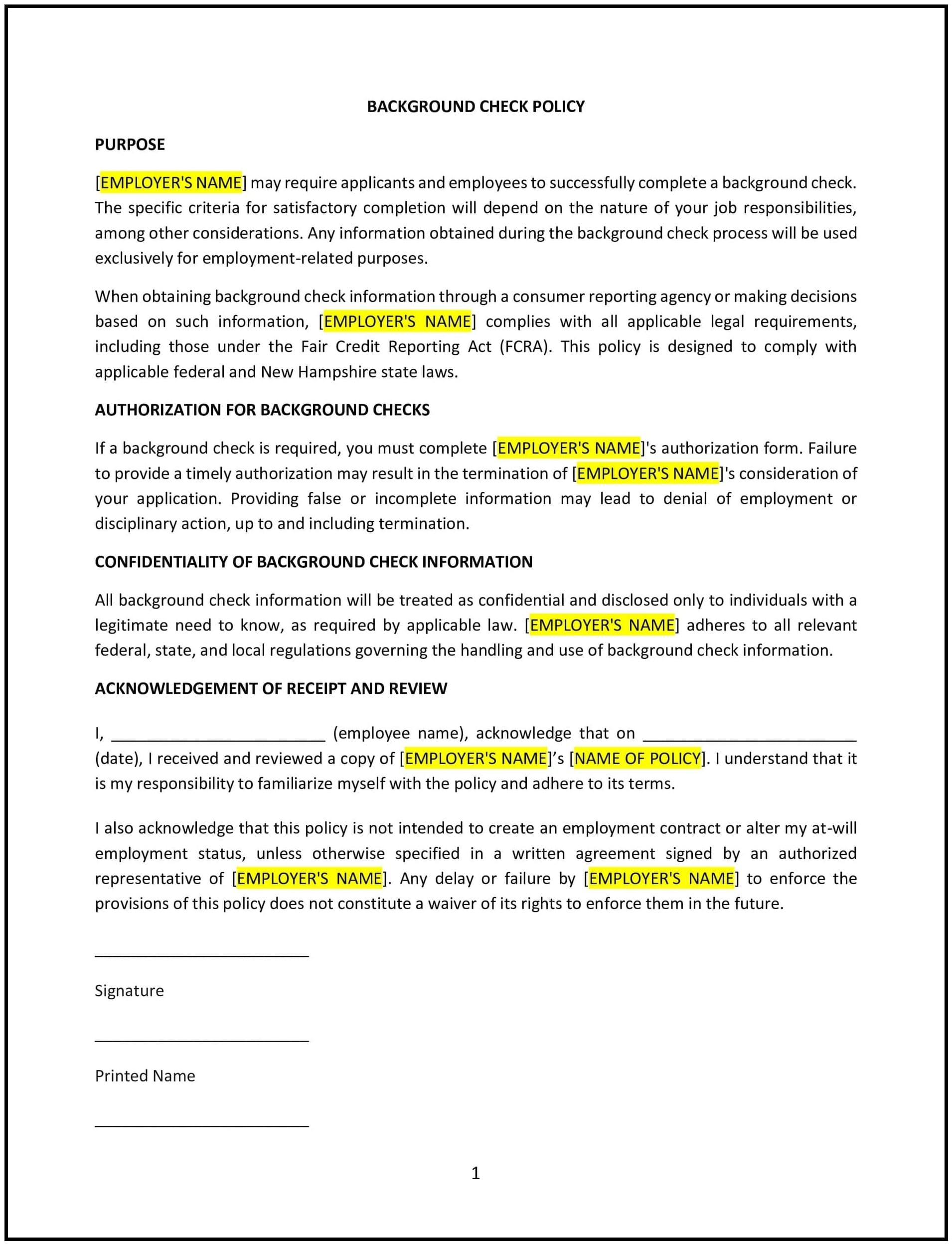Background check policy (New Hampshire): Free template
Got contracts to review? While you're here for policies, let Cobrief make contract review effortless—start your free review now.

Customize this template for free
Background check policy (New Hampshire)
A background check policy helps New Hampshire businesses establish consistent procedures for conducting background checks on potential and current employees. This policy outlines when and how background checks will be conducted, the types of checks performed, and how the results will be used to make informed hiring or employment decisions.
By adopting this policy, businesses in New Hampshire can ensure that background checks are done fairly, transparently, and in compliance with state regulations, while protecting the company from potential legal risks.
How to use this background check policy (New Hampshire)
- Define when background checks will be conducted: Specify when background checks will be required, such as during the hiring process, for promotions, or when employees take on positions involving greater responsibility or access to sensitive information.
- Specify the types of background checks: Clearly state the types of checks that may be performed, including criminal background checks, credit checks, employment verification, education verification, and reference checks.
- Obtain consent: Ensure that employees and applicants provide written consent before a background check is conducted, and inform them of what information will be collected.
- Use background checks responsibly: Explain how background check results will be used in the decision-making process, ensuring that decisions are based on the relevance of the information to the employee’s position.
- Protect privacy: Outline how background check information will be handled, including who will have access to the results, how the data will be stored, and how long it will be retained.
- Address adverse findings: Include guidelines for how the company will address adverse findings (e.g., criminal convictions) and ensure a fair process for employees to explain or contest the results.
- Ensure legal compliance: Ensure that background checks comply with New Hampshire state laws, including laws governing the use of criminal records, credit reports, and other sensitive information.
- Review and update: Regularly review the policy to ensure it aligns with New Hampshire regulations, business needs, and evolving best practices.
Benefits of using this background check policy (New Hampshire)
This policy provides several benefits for New Hampshire businesses:
- Enhances hiring decisions: Helps businesses make informed decisions by identifying potential risks and verifying the background of candidates or current employees.
- Protects company assets: Ensures that employees entrusted with sensitive information or positions of authority have a history that reflects trustworthiness and reliability.
- Reduces liability: Minimizes the risk of hiring individuals who may pose a safety or security risk, protecting the business from legal liabilities and reputational damage.
- Promotes fairness and transparency: Provides clear guidelines for conducting background checks, ensuring that all employees and applicants are treated fairly and consistently.
- Helps comply with state regulations: Assists businesses in complying with New Hampshire state laws related to background checks, employment practices, and privacy rights.
Tips for using this background check policy (New Hampshire)
- Communicate the policy clearly: Ensure that all applicants and employees understand the background check process, the types of checks conducted, and how the results will be used in the hiring or employment decision.
- Obtain consent before conducting checks: Ensure written consent is obtained from all applicants and employees before any background checks are performed, as required by New Hampshire law.
- Use background checks fairly: Avoid making decisions based solely on negative findings that may not be relevant to the employee’s role, such as minor offenses or issues that occurred a long time ago.
- Maintain confidentiality: Store and manage background check information in a secure manner to protect the privacy of employees and applicants, ensuring it is only accessible to those with a legitimate need.
- Review the policy regularly: Periodically review the policy to ensure it complies with current New Hampshire state laws and industry best practices.